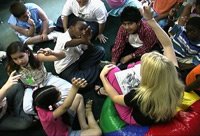
It was good to feel "at home" for a few days. It was good to sit in conversations with scholars and educators who understand that studies of educational policy that produce numerical averages of improved "results" on a measure or two do not tell us anything about what educational practices do for individual children. It was good to hear people who understand that the divide between "special education" and "regular education" is typically a false and destructive one. It was good to listen to leaders like Kim Reid and Susan Peters and Deb Gallagher (among many others) who have been fighting for all students to be treated fairly and decently for years.
I spent last weekend at the 2006 Disability Studies in Education Conference held, conveniently for me, at Michigan State University. Disability Studies is not what Americans call "Special Education," it is much more than that. Disability Studies looks in depth at the way "disability" is "constructed" and defined by society (no one really knew they were "reading disabled" until everyone was told they needed to learn to read), and the role education plays in the re-inforcement and amelioration of that.
So at the conference everything from Universal Design for Learning Technology (me, yes) to the role of humor, to classroom discourse, to international comparisons, to how teacher education programs might be altered, to "No Child Left Behind," to the need for post-graduate affirmative action for students with learning disabilities, was discussed. It was powerful stuff, unfortunately far out of the mainstream at too many colleges and schools of education, who continue to view "people with disabilities" as a medical problem that needs to be cured.
A few key links...
Disability Studies Quarterly
The Society for Disability Studies
Disability Studies for Teachers (Syracuse University)
The Center for Disability Studies (University of Leeds)
Review of Disability Studies (International)
There was one lowpoint though. After seeing a brilliant film on the brutality of George W. Bush's educational policies, No Child Left Behind, by young teacher and film-maker Lerone Wilson, I asked the assembled group: "If we all know that this law is terrible, that it starts from the absurd assumption that all children develop at the exact same rate and punishes those who fail to be perfectly "normal," what is the responsibility of colleges of education to stand up and fight? Don't we have to actively protect the children?"
educational policies, No Child Left Behind, by young teacher and film-maker Lerone Wilson, I asked the assembled group: "If we all know that this law is terrible, that it starts from the absurd assumption that all children develop at the exact same rate and punishes those who fail to be perfectly "normal," what is the responsibility of colleges of education to stand up and fight? Don't we have to actively protect the children?"
No one said anything in response, except to say that "people are afraid" in this political climate.
But on the way out nine people came up to me, slapped me on the shoulder and said, "good question. Did you notice no one answered you?"
I had noticed.
-Ira Socol
Tuesday, May 23, 2006
Disability Studies Conference 2006
Subscribe to:
Post Comments (Atom)
Popular posts
-
Procter&Gamble has the tagline very wrong, but their Olympics ads explain what is crucially wrong with the argument espoused by those w...
-
(1) ending required sameness (2) rejecting the flipped classroom (3) re-thinking rigor (4) its not about 1:1 (5) start ...
-
There are two big things going on in the world this week, one fifty years old, one absolutely current, which should keep your students talki...
-
Would Walter Cronkite be happy with the way Walter Cronkite's death has been reported? And what does that say about the way in which we ...
-
I ended up in two big educational debates this past week. One was about "clickers" - those "Classroom Response Systems" ...
-
In 1994 the United States government added the requirement to "Section 504" 1 that all schools (primary, secondary, post-second...
-
A conversation on the SpeEdChange list (see right column) asked about free solutions. So lets go public with this. This is important because...
-
I was working on a lesson with sixth graders and middle school teachers in doing math without any tools, just in your head. Not memorizatio...
-
“It’s just like living in a village, where it’s actually hard to lie because everybody knows the truth already,” Tufekci said [ Zeynep Tufek...
-
"Here’s what I think: learning styles may exist (although the studies that show that they do are generally specious), but they’re large...







No comments:
Post a Comment